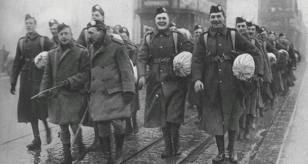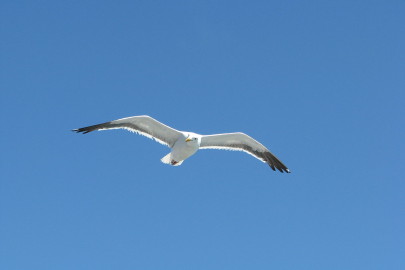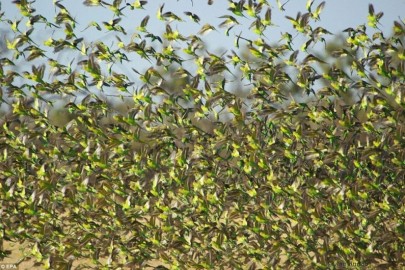Dabbler editor Gaw with a poem for 11/11/11…
It’s always the fellowship that seems most important to soldiers; ultimately, it’s what persuades them to die. Doesn’t that fit the definition of a tragedy?
This poem by the late Mick Imlah describes the fate of the players of the London Scottish rugby club in the First World War (some background here).
London Scottish
(1914)
April, the last full fixture of the spring:
‘Feet, Scottish, feet’ – they rucked the fear of God
Into Blackheath. Their club was everything:
And of the four sides playing that afternoon,
The stars, but also those from the back pitches,
All sixty volunteered for the touring squad,
And swapped their Richmond turf for Belgian ditches.
October: mad for a fight, they broke too soon
On the Ypres Salient, rushing the ridge between
‘Witshit’ and Messines. Three-quarters died.
Of that ill-balanced and fatigued fifteen
The ass selectors favoured to survive,
Just one, Brodie the prop, resumed his post.
The others sometimes drank to ‘The Forty-Five’:
Neither a humorous nor an idle toast.












From the Scots to the Welsh:
First Time In
by Ivor Gurney
After the dread tales and red yarns of the Line
Anything might have come to us; but the divine
Afterglow brought us up to a Welsh colony
Hiding in sandbag ditches, whispering consolatory
Soft foreign things. Then we were taken in
To low huts candle-lit shaded close by slitten
Oilsheets, and there but boys gave us kind welcome;
So that we looked out as from the edge of home.
Sang us Welsh things, and changed all former notions
To human hopeful things. And the next days’ guns
Nor any line-pangs ever quite could blot out
That strangely beautiful entry to War’s rout,
Candles they gave us precious and shared over-rations —
Ulysses found little more in his wanderings without doubt.
‘David of the White Rock’, the’ Slumber Song’ so soft, and that
Beautiful tune to which roguish words by Welsh pit boys
Are sung — but never more beautiful than here under the guns’ noise.
A little more of Gurney: this time the English:
I watched the boys of England where they went
Through mud and water to do appointed things.
See one a stake, and one wire-netting brings,
And one comes slowly under a burden bent
Of ammunition. Though the strength be spent
They “carry on” under the shadowing wings
Of Death the ever-present. And hark, one sings
Although no joy from the grey skies be lent.
Are these the heroes—these? have kept from you
The power of primal savagery so long?
Shall break the devil’s legions? These they are
Who do in silence what they might boast to do;
In the height of battle tell the world in song
How they do hate and fear the face of War.
Forgive me, Gaw, but on this day I’m drawn to a glorious accompaniment to war poetry: Vaughan Williams’ Pastoral Symphony, referred to in Mahlerman’s marvellous post on Sunday. The RVW Society describes it like this:
Vaughan Williams’ third symphony is not ‘pastoral’ in the same sense as Beethoven’s Sixth; it is instead an encapsulation of his experiences in the First World War, when he served in the ambulance unit. However the work is not full of military marches and martial drums, but instead looks beyond the war to a more contemplative and transcendent kind of elegy. The emotional core of the symphony is its third movement, the climax of which, according to Michael Kennedy, seems to represent the composer’s reaction to the loss of his friends before and during the war. The last movement begins and ends with a wordless song by a solo soprano, leading the music up to an other-worldly plane.’
Here is the glorious final movement:
http://www.youtube.com/watch?v=7MWsJDh_nm4&feature=related
Not quite relevant to your beautifully observed point about fellowship, but a poem I always return to on Remembrance Day.
Break of Day in the Trenches
Isaac Rosenberg
The darkness crumbles away
It is the same old druid Time as ever,
Only a live thing leaps my hand,
A queer sardonic rat,
As I pull the parapet’s poppy
To stick behind my ear.
Droll rat, they would shoot you if they knew
Your cosmopolitan sympathies,
Now you have touched this English hand
You will do the same to a German
Soon, no doubt, if it be your pleasure
To cross the sleeping green between.
It seems you inwardly grin as you pass
Strong eyes, fine limbs, haughty athletes,
Less chanced than you for life,
Bonds to the whims of murder,
Sprawled in the bowels of the earth,
The torn fields of France.
What do you see in our eyes
At the shrieking iron and flame
Hurled through still heavens?
What quaver -what heart aghast?
Poppies whose roots are in men’s veins
Drop, and are ever dropping;
But mine in my ear is safe,
Just a little white with the dust.
Thanks all for your contributions.